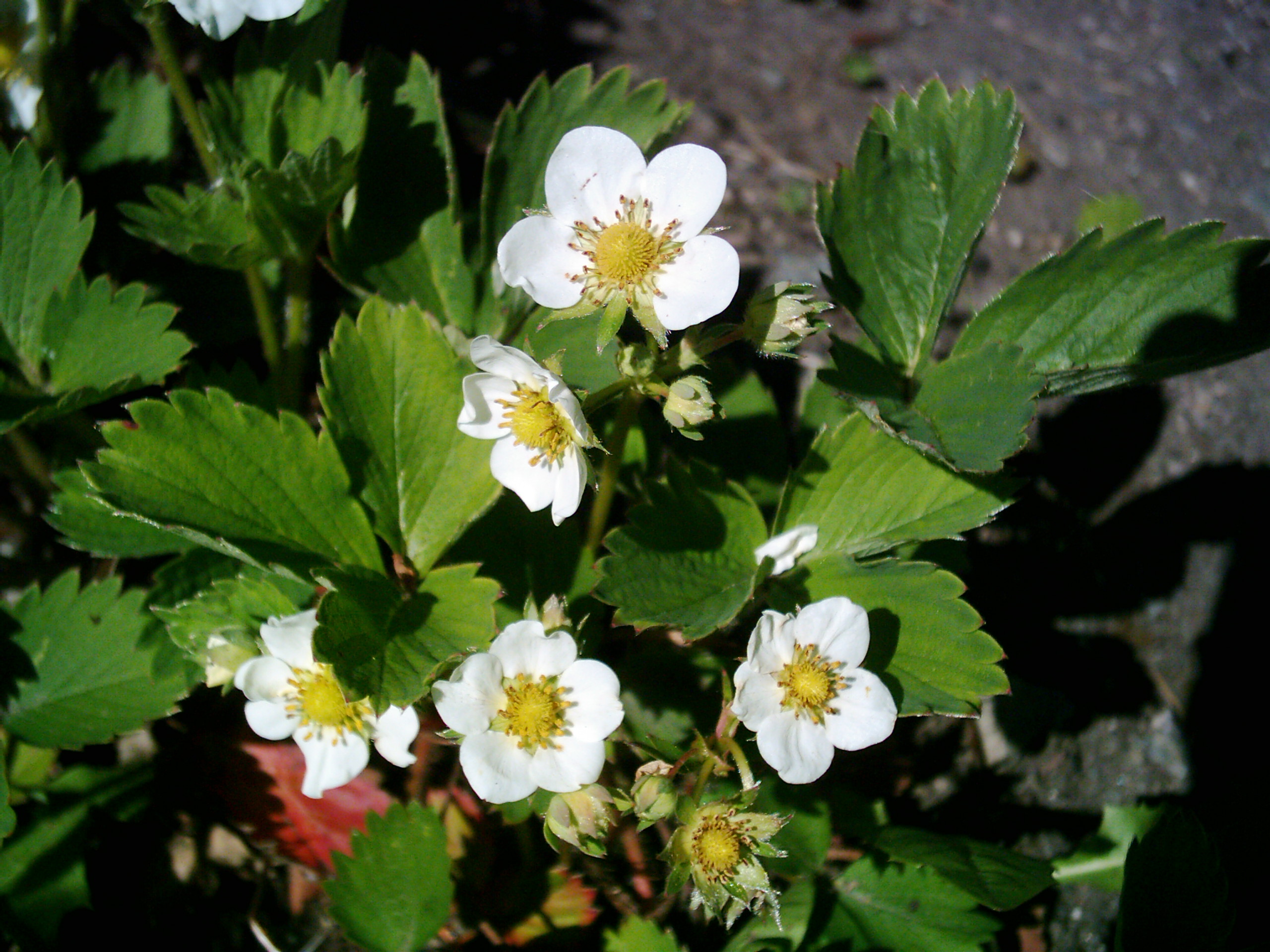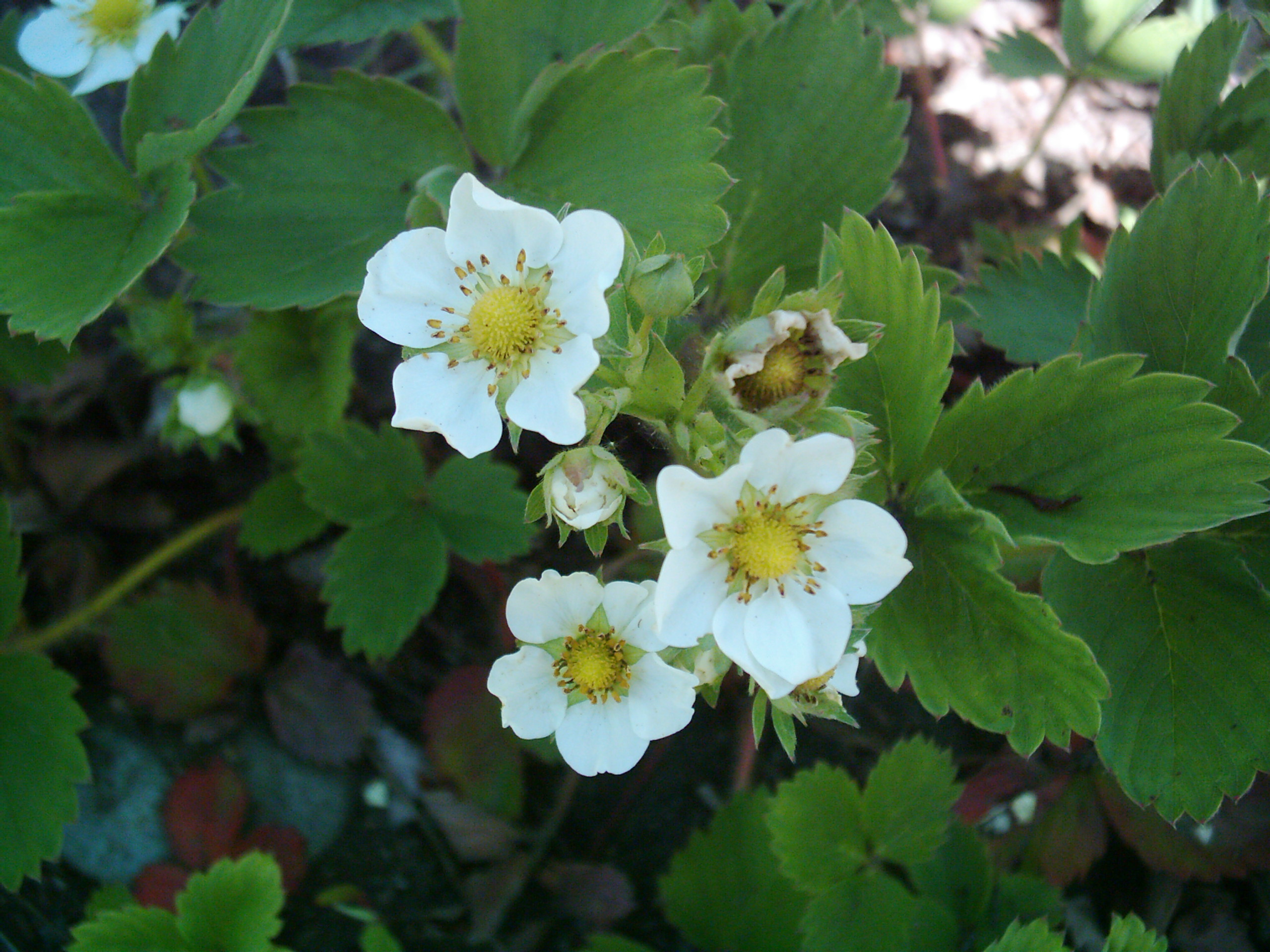Delicious Strawberries
One bright spring day many years ago our son came to visit us. He must have had spring fever. What he had with him was several trays of potted plants. Among them were pansies, marigolds, and other flowers. But some of them were strawberry plants. Over the years they have been transplanted to different places in the garden and always seem to give us a small taste each year of their wonderful unique flavor.

A few years ago we thought it would be pretty to see them hanging down the sides of the planter boxes in the garden. So strawberry plants were planted in two of these boxes and they did grow beautifully and some berries showed up as well. They were left in the boxes over the winter and they did not survive in the boxes and froze. So we lost most of the strawberry plants.

Fortunately, though, there were a few that had started their runners into the ground when they hung over the sides, so they have multiplied slowly and there is a small row of strawberries to give us a taste. They like attention even though they are very easy to grow.
CULTIVATING
"There are more systems laid down in books than we have time or space to mention. Will simply give our experience.
Of course the land freest from weeds has been selected, but for this reason the weeds which remain should not be neglected, or they will soon obtain the mastery of the plants. We commence cultivating as soon as the weeds start in the spring; first going through the rows twice with an adjustable horse cultivator shut up so as not to interfere with the plants. Then following with a hoe, taking from the rows everything in the line of the weeds left by the cultivator. The beds should be kept free from weeds by all means. For city cultivation of course a hoe must take place of a cultivator.
If the object be to propagate plants, the bed should be well weeded until runners are in the way. After this they should not be disturbed till after the plants are taken up in the fall or spring. Persons adopting this method will find the tending of a Strawberry bed is but little more work than tending potatoes, corn, or beans. Strawberries should be well cultivated until the time of blossoming. After this they should not be disturbed till after they are through bearing, as it blasts the blossoms, and injures the formed berries.
Three bearing years are as long as it is profitable, as a general rule, for a bed to remain without renewing. If you wish to put Strawberries on the same ground again, it should be manured and put into other crops for a year or two, after which it may be again planted to Strawberries, as no ground should be run too long with one crop.
The best method of manuring Strawberries, is to cover them in the fall with forest leaves, straw, or almost any vegetable matter. In the spring it should be removed where it is thick enough to retard the growth of the plants, allowing them to come up through the dressing."
1870 JW, SFCC 9
"For the lady students there are many employments which should be provided, that they may have a comprehensive and practical education. They should be taught dressmaking and gardening. Flowers should be cultivated and strawberries planted. Thus, while being educated in useful labor, they will have healthful outdoor exercise.
The influence of the mind on the body, as well as of the body on the mind, should be emphasized. The electric power of the brain, promoted by mental activity, vitalizes the whole system, and is thus an invaluable aid in resisting disease.
There is a physiological truth—truth that we need to consider—in the scripture, "A merry [rejoicing] heart doeth good like a medicine." Proverbs 17:22.
In order for children and youth to have health, cheerfulness, vivacity, and well-developed muscles and brains, they should be much in the open air, and have well-regulated employment and amusement. Children and youth who are kept at school and confined to books cannot have sound physical constitutions. The exercise of the brain in study, without corresponding physical exercise, has a tendency to attract the blood to the brain, and the circulation of the blood through the system becomes unbalanced. The brain has too much blood, and the extremities too little. There should be rules regulating the studies of children and youth to certain hours, and then a portion of their time should be spent in physical labor. And if their habits of eating, dressing, and sleeping are in accordance with physical law, they can obtain an education without sacrificing physical and mental health."
CCh 209
"Sometimes we gave entertainments, and we took great care that all that we prepared for the table was palatable and nicely served. In fruit season, we would get blueberries and raspberries fresh from the bushes, and strawberries fresh from the vines."
CD 473
"Well, the school has made an excellent beginning. The students are learning how to plant trees, strawberries, etc.; how they must keep every sprangle and fiber of the roots uncramped in order to give them a chance to grow. Is not this a most precious lesson as to how to treat the human mind, and the body as well--not to cramp any of the organs of the body, but give them ample room to do their work? The mind must be called out, its energies taxed. We want men and women who can be energized by the Spirit of God to do a complete work under the Spirit's guidance. But these minds must be cultivated, employed, not lazy and dwarfed by inaction. Just so men and women and children are wanted who will work the land, and use their tact and skill, not with a feeling that they are menials, but that they are doing just such noble work as God gave to Adam and Eve in Eden, who loved to see the miracles wrought by the divine Husbandman. The human agent plants the seed, and God waters it and causes His sun to shine upon it, and up springs the tiny blade. Here is the lesson God gives to us concerning the resurrection of the body, and the renewing of the heart. We are to learn of spiritual things from the development of the earthly."
TM 242